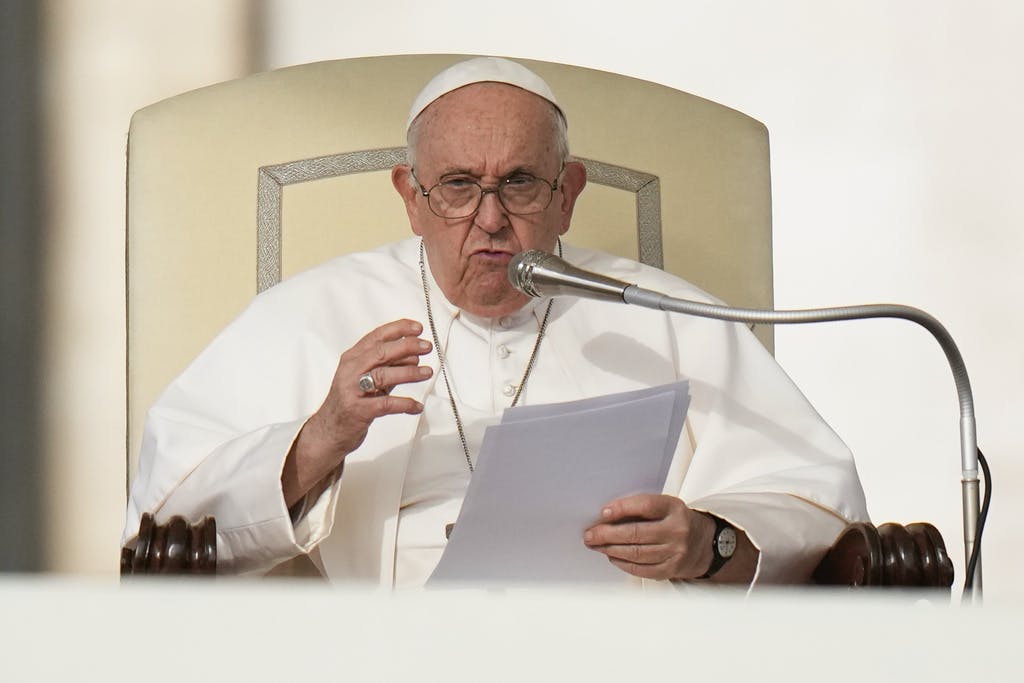The Pope Wants Ukraine To Wave the White Flag — Does That Mean He’s an Isolationist or a ‘Realist’?
Some pundits of the ‘realist’ school of foreign policy are arguing that America’s national interest is not so narrowly defined.

Pope Francis, isolationist? Could the man who sits on the throne of Saint Peter emerge as the latest advocate of a Ukrainian surrender to Russia? It’s starting to look that way, following an interview, obtained by Reuters, that is due to be broadcast on March 20.
His Holiness was asked for his view on whether Ukraine should give up its offensive and wave the “white flag.” He responded that in the best interpretation of the current situation, Ukraine should have “the courage of the white flag” and negotiate, using international support, an end to its war with Russia.
The situation begs to be taken with a biblical grain of salt. Pope Francis has a Marxist streak that is unusual among the pontiffs — and a long way from, say, Pope John Paul II, who played a historic role in delegitimizing the Soviet Union and its communist, atheistic government.
His Holiness, who has long spoken about the need for a negotiated settlement between Kyiv and Moscow, went so far in his interview as to mention Turkey among the countries that had offered to mediate. He even offered himself up as a potential meditator.
President Zelensky did not directly respond to the pontiff’s remarks. In his Sunday evening video address, the president seemed to suggest, without naming the pontiff, that His Holiness was engaging in a “virtual mediation between someone who wants to live and someone who wants to destroy you.”
The pope’s view underscores the wavering international support for Ukraine more than two years into the war. In America, that sentiment has come to a head in Congress, where a bill to send $60 billion in funding to Ukraine has hit roadblocks in the House after passing the Senate.
To placate conservative critics, top House Republicans who support funding Ukraine are now working to develop their own aid package that aims to treat nonmilitary aid as a loan. More than half of Republicans believe America is spending too much on Ukraine, according to a recent poll by the Associated Press-NORC Center.
The argument of skeptics is that investing in a territorial dispute on another continent without a long-term and well-articulated plan to end the war — particularly while the crisis worsens at America’s own borders — is against America’s national interest.
Yet some pundits of the “realist” school of foreign policy are arguing that America’s national interest is not so narrowly defined. They are alarmed at the reports of Ukrainian soldiers running short on ammunition and grasp that American aid could be a lifeline in the war effort. By this school of thought, defeating President Putin means defending democracy in Europe.
“No dollar in the defense budget has a higher return on investment than the dollars going to provide ammunition and arms to Ukraine,” the founding dean of the Harvard Kennedy School of Government, Graham Allison, who served as assistant secretary of defense under President Clinton, tells the Sun. He says the benefits of American engagement are almost “too good to be true.”
Partners in the North Atlantic Treaty, like Germany, have moved to invest what could be hundreds of billions of dollars in building their own defense capabilities. Finland and Sweden have acceded to the treaty. Economic sanctions and military failures have weakened Russia.
It turns out that there is more than one brand of realism. Mr. Allison describes himself as a “structural realist.” This school of foreign policy, he tells the Sun, understands the world as it is and, rather than accept it fatalistically, finds a way to nudge it toward what the world should be.
Some invoke this mentality to support non-interventionist policies, like the “America First” conservatives in Congress who voted against the foreign aid bill, echoing the wishes of their party’s presumptive 2024 presidential nominee, President Trump.
Advocates for Mr. Zelensky’s defense against Mr. Putin also appear to invoke the idea of realism. Ukraine’s foreign minister, Dmytro Kuleba, urges the Vatican “to avoid repeating the mistakes of the past.” He cites reports that Pope Pius XII failed to act against the Nazis in Germany in World War II. “Our flag is a yellow and blue one,” Mr. Kuleba writes on X. “This is the flag by which we live, die, and prevail. We shall never raise any other flags.”

